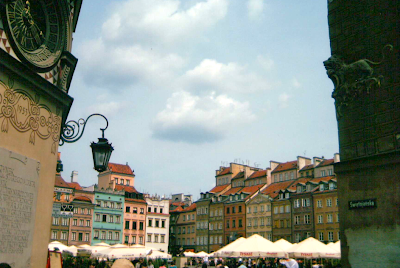Last Thursday, I received an email from The Polish Center, a Polish heritage club that I belong to, announcing upcoming events. An Author's Night was to be held featuring two authors who's books deal with Polish experiences, James Conroyd Martin, and Dr. James Pula.
A list of books followed the author's name, James Conroyd Martin's name was listed first, so I Googled the title of his first book.
I have confessed this in other blog posts that I judge a book by its cover, and I typically do not like to read male authors; however when I found that
Push Not The River was based on the diary of a Polish Countess I decided to read it.
 |
First novel by James Conroyd Martin
published in 2003 |
The summary below is from
The Polonia Portal "Anna Maria is only seventeen when she loses both of her parents and must leave the only home she has ever known to go live with her Aunt Stella. With this new life she is quickly thrust into a world of love and hate, patriotism and treason, life and death. As neighboring countries threaten to tear Poland apart, Anna finds strength in her new guardian, who comes to personify for Anna Poland’s courage and spirit.
Anna finds love in her new home in the person of Jan, a brave patriot and architect of democracy. But she finds conflict, too, in the darkly sinister intentions of her beautiful, enigmatic, and shape shifting cousin Zofia.
With time, Anna learns that in politics and in love she must place herself in the way of destiny. Vivid, romantic, and thrillingly paced, Push Not the River paints the emotional and unforgettable story of the metamorphosis of a nation—and of a proud and resilient young woman."
Despite my prejudice about male author's writing styles, I admit I did enjoy this book. The story line of romance held my interest, but it was the historical references to places in Poland that held my interest.
In 2009, I spent ten days touring Poland, and, in fact, had visited a few places written about in the book. After finishing the book, I searched for my photos from Poland.
The White Eagle is the oldest of Poland's national symbols. It is the emblem, and coat of arms. The white eagles origins are both legendary and historical. This eagle decorated a building in the Old Town Market Square in, Warsaw.
Old Town Warsaw's Market Square, or Old Town Market Place, is the heart of this historic district. The square was reconstructed after WWII back to it's Renaissance era look. Each building has architectural details that signify something about it's history.
The Royal Castle and King Zygmunt's Column located in Castle Square, Old Town Warsaw. The castle was the residence to the kings of Poland, and an important part in the history of the city. The Royal Castle now serves as a museum.
Zygmunt's Column, is one of Europe's oldest secular monuments, it was erected in 1644. Zygmunt is remembered for transferring the capital of Poland from Krakow to Warsaw in the late 16th century.
King Zygmunt is dressed in armor and holds a cross in one hand and a sword in another.
The Black Madonna of Czestochowa is Poland's holiest and most important relic.
Since I had visited these places, when they were mentioned in the book, in my minds eye I could imagine what they must have looked like during the 1700's
James Conroyd Martin has authored two more books that are set in Poland, perhaps I will give them a try.
Cheerfully,


















































